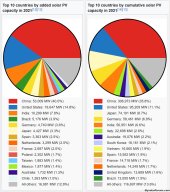Hedges
I See Electromagnetic Fields!
- Joined
- Mar 28, 2020
- Messages
- 21,303
Also since my sungold is LF it can surge 3 times the rated capacity of 6kw to do 18kw for 3 seconds. No HF can do that.
HF Midnight Rosie can do similar and/or longer (specs seem to be a bit in flux from various sources, not nailed down in official data sheet. Not sure if that is firmware updates or conservative specs.)
7000W surge to 15,000 VA per Midnight site, 20,000 VA at Alt E store.
But not cheap. Two out of three ain't bad?
Now, split-phase with LF transformer can probably deliver entire surge at 120V.




